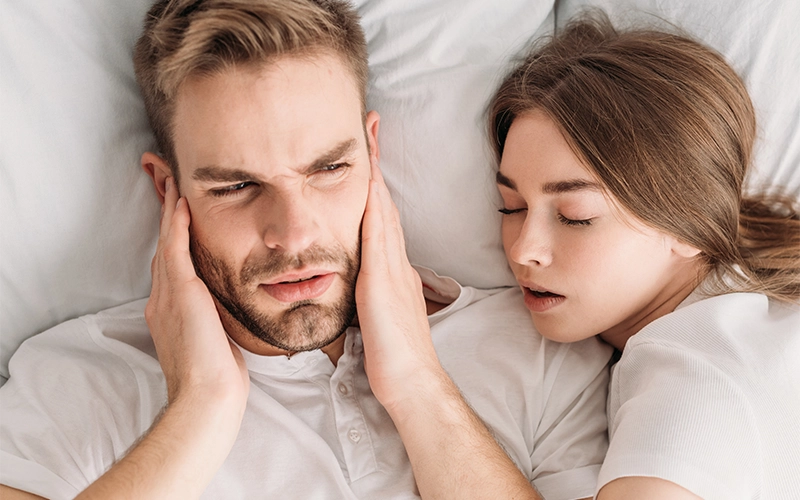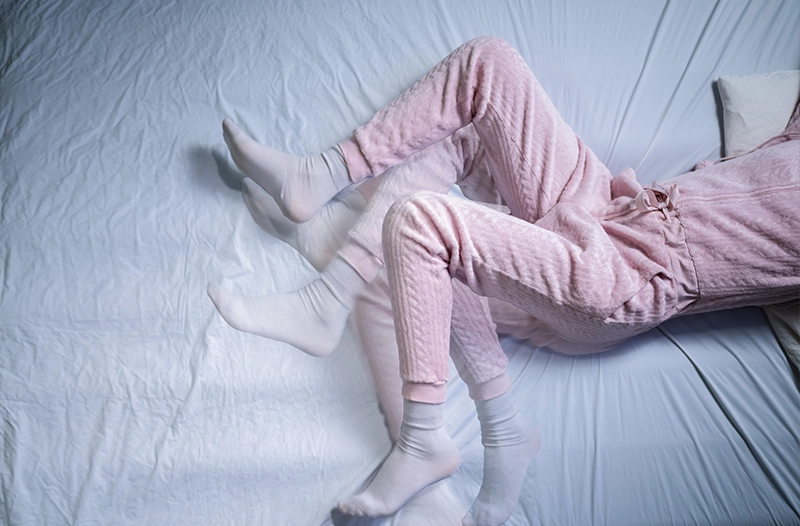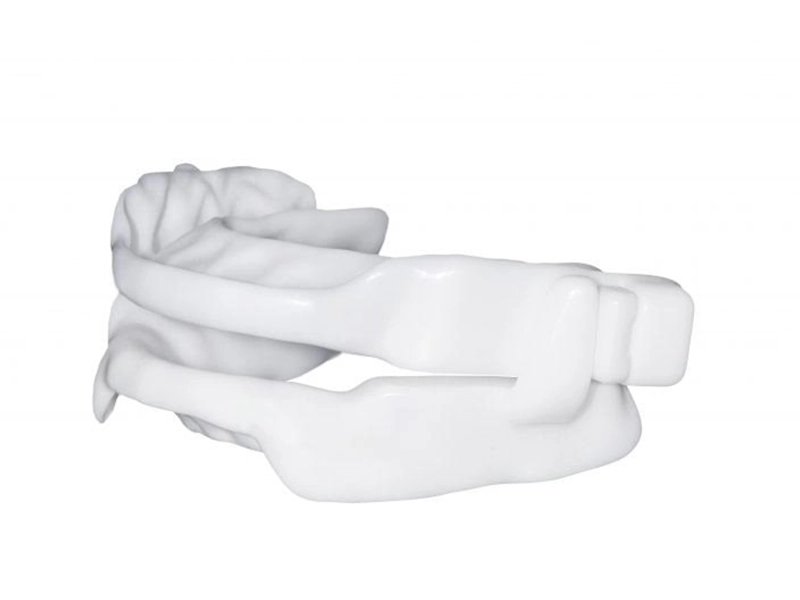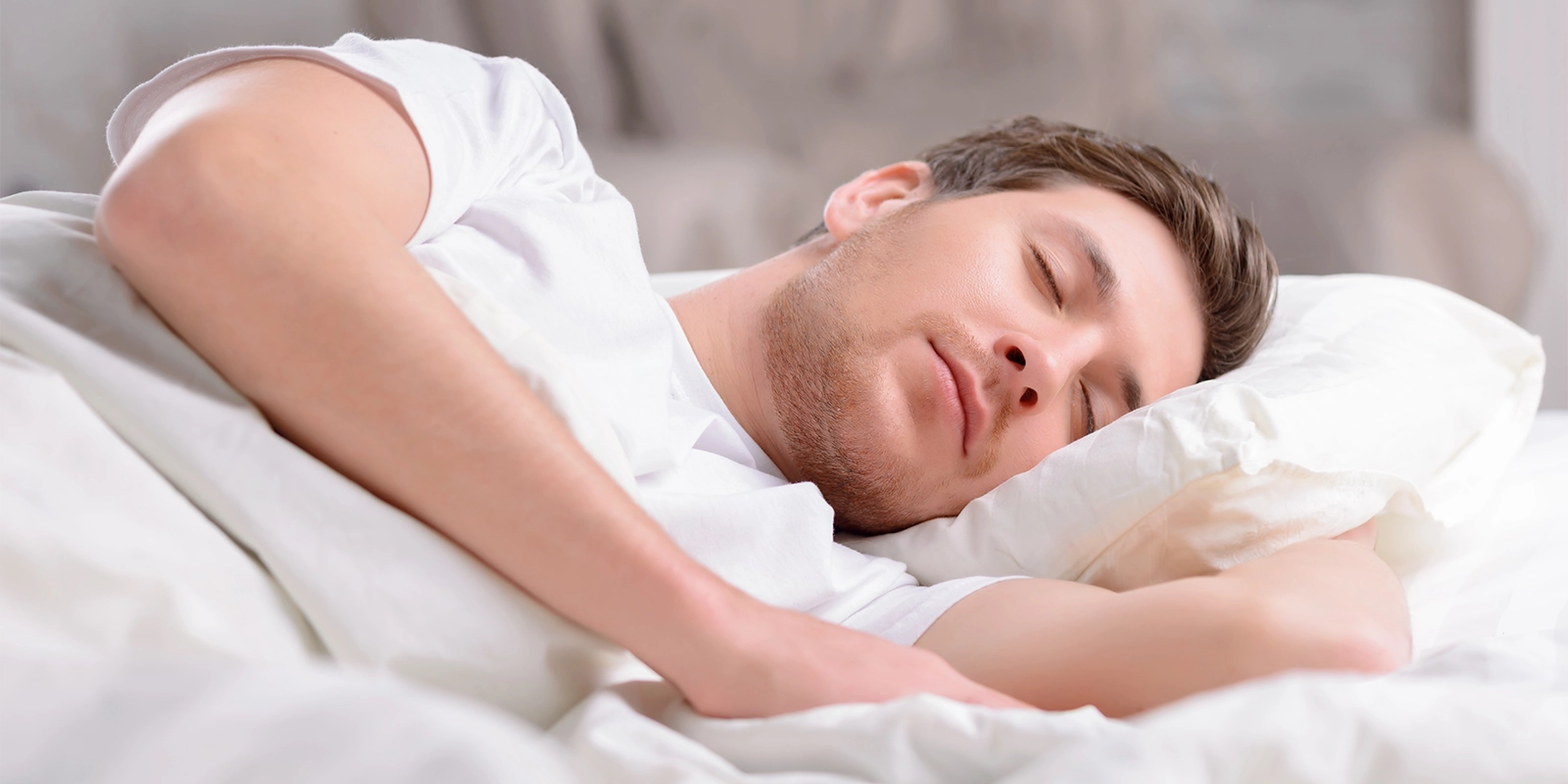Sleep is critical in our quest to thrive. It preserves our physical and mental health by allowing our bodies and minds to recover. However, few people consider its integral role in oral health. Sleep disorders can contribute to various dental issues, from teeth grinding and sleep apnoea to dry mouth and an increased risk of gum disease.
In this blog, we will discuss how sleep disorders and disruptions can adversely affect our oral health and what you can do to keep your mouth healthy despite having sleep issues.
Sleep disorders
Sleep disorders encompass a range of conditions that interfere with the normal sleep cycle. From snoring to sleep apnoea, these disorders can result in inadequate or disrupted sleep. Here are some common types of sleep disorders and their symptoms:
Snoring
Snoring is a common sleep-related sound that comes from the vibration of throat tissues during breathing. Simple snoring is highly prevalent, affecting approximately 30% of Australian adults.

Often seen as just a minor annoyance, snoring can actually be a sign of underlying sleep disorders, such as sleep apnea. Also, when snoring is loud and persistent, it can disrupt your sleep and that of your bed partner. For these reasons, and more, addressing snoring is important for better sleep quality and overall health.
Insomnia
Insomnia is characterised by difficulty falling or staying asleep, even when there is an opportunity for sleep. Symptoms include feeling tired during the day, difficulty concentrating and irritability. People at risk include those with high stress levels, individuals with irregular sleep schedules and those with mental health conditions.
Obstructive sleep apnoea (OSA)
Approximately 20% of Australians suffer from obstructive sleep apnoea. OSA occurs when the throat becomes partially or completely blocked during sleep, leading to interrupted breathing. Symptoms include loud snoring, gasping for air during sleep, excessive daytime sleepiness and morning headaches. Risk factors include being overweight, being male, excessive alcohol consumptionhaving a family history of OSA and, for females, being post-menopausal.
Sleep apnoea in children
Sleep apnoea is not exclusive to adults, and it can also impact children. Sleep apnoea in children can result in delayed development, learning challenges and behavioural problems.
Restless legs syndrome (RLS)
RLS is characterised by an irresistible urge to move the legs, often accompanied by uncomfortable sensations. Symptoms are more pronounced during rest periods, such as sitting or lying down. RLS is more common in women and tends to worsen with age.

Narcolepsy
Narcolepsy involves excessive daytime sleepiness and sudden, uncontrollable sleep attacks. People with narcolepsy may experience sudden muscle weakness (cataplexy) in response to emotions. The exact cause of narcolepsy is unknown, but genetics play a role.
Shift work disorder
Shift workers and people with irregular work schedules often experience difficulty adjusting their sleep-wake cycle to match their work schedule. Their symptoms include insomnia and excessive sleepiness during work hours.
Oral health risks associated with sleep disorders
Although it may not be readily apparent, there is a strong connection between sleep disorders and oral health. Here’s how these issues can affect your mouth:
Dry mouth
Dry mouth, medically known as xerostomia, is a common side effect of many sleep disorders, particularly those that cause mouth breathing. Conditions like sleep apnoea frequently result in unconscious mouth breathing while sleeping. This mouth breathing significantly reduces the natural flow of saliva in the oral cavity.
Saliva is essential for maintaining oral health because it is a natural cleanser, neutralising acids and removing food particles and harmful bacteria. Without sufficient saliva, the mouth is more susceptible to tooth decay, bad breath (halitosis) and gum diseases.
Bruxism (Teeth grinding)
Bruxism, the habitual grinding or clenching of teeth, is a common issue associated with sleep disorders, particularly obstructive sleep apnea (OSA). When individuals experience disruptions in their sleep, particularly during apnoea episodes, their brain can trigger grinding or clenching as a response to the stress.
Teeth grinding often occurs unconsciously and can lead to a range of dental problems. Over time, bruxism can wear down tooth enamel, chip or crack teeth and even cause jaw pain or temporomandibular joint (TMJ) disorders.
Gum disease
Gum disease, or periodontal disease, occurs due to the buildup of plaque, a sticky film of bacteria, on teeth and gums. Poor sleep can negatively impact the immune system, reducing its ability to fight infections such as gum disease.
Insufficient sleep weakens the body’s defence mechanisms, making it easier for bacteria to cause inflammation and damage gum tissues. Furthermore, untreated gum disease can lead to more severe oral health problems, such as gum recession, tooth mobility and premature tooth loss.
Temporomandibular joint (TMJ) disorders
The temporomandibular joint (TMJ) connects the jawbone to the skull and is responsible for actions like chewing and talking. Disrupted sleep patterns, particularly those caused by sleep disorders, can lead to heightened tension and stress in the jaw muscles.
This added pressure can exacerbate or trigger TMJ disorders, leading to symptoms like jaw pain, headaches, clicking or popping sounds when opening and closing the mouth and difficulties in fully moving the jaw. Individuals who have teeth grinding problems are also more likely to experience TMJ-related discomfort.
Sleep disorder treatment and oral care
Consult a professional: If you suspect you have a sleep disorder, don’t hesitate to contact a medical professional. They’re trained to identify and address sleep-related issues. A medical professional can recommend the right diagnostic tests and appropriate treatment options tailored to your condition.
CPAP therapy: Continuous Positive Airway Pressure (CPAP) therapy is a standard treatment for moderate to severe sleep apnoea. A CPAP machine provides gentle airflow through a mask, preventing airway collapse and ensuring continuous breathing throughout the night.
Good sleep hygiene: Healthy sleep habits are crucial for managing sleep disorders. Maintain a consistent sleep schedule by going to bed and waking up at the same time each day. Create a sleep-conducive environment by keeping your bedroom dark, quiet and comfortable. Limit screen time before bed and engage in relaxing activities that signal your body it’s time to wind down.
Regular dental care: Don’t neglect the importance of dental care in addressing the impact of sleep disorders on oral health. Regular visits to the dentist are necessary for professional cleanings, check-ups and early detection of potential dental problems. Your dentist can also guide you on maintaining excellent oral hygiene, considering the impacts of your sleep problems.
Weight management: For sleep disorders aggravated by weight, such as sleep apnoea, weight management is a crucial factor. Maintaining a healthy weight can substantially improve sleep quality and lessen the severity of sleep apnoea symptoms.

Oral appliances for sleep apnoea: In the case of sleep apnoea, consider oral appliances prescribed by certified dentists. These devices include Mandibular Advancement Devices (MAD), nightguards and splints. Custom-made to fit comfortably in your mouth, they keep your airways open during sleep, allowing you to breathe easier. This option particularly benefits those who find CPAP machines uncomfortable or impractical.
Sleeping position adjustment: Your sleep position can influence the severity of certain sleep disorders. For example, elevating your head and sleeping on your side can help prevent the relaxation of throat muscles, reducing the likelihood of snoring and sleep apnoea episodes.
Stress reduction techniques: Stress and anxiety can worsen sleep disorders. Incorporate stress-reduction techniques into your daily routine, such as deep breathing exercises, meditation or gentle yoga. These practices can help relax your mind and body, making falling and staying asleep easier.
Healthy sleep for a healthy mouth

Although the connection between sleep disorders and oral health may not be immediately obvious, you should not underestimate its importance to our overall health. Understanding how sleep disorders can impact oral health and implementing appropriate techniques to address sleep-related problems paves the way to a healthier smile and better sleep quality with immediate and long term benefits.
When you ensure that your body gets enough quality sleep, your mouth will be sure to thank you!



